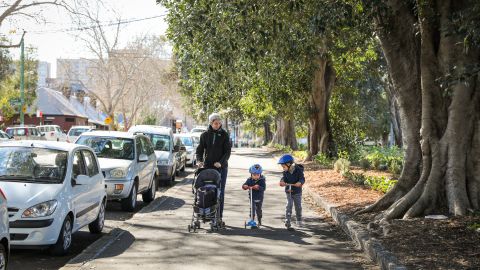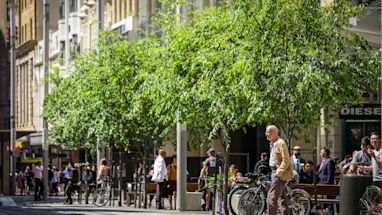Like the rest of Australia, life for many in our local area has been difficult in the face of the global pandemic.
We may have been shut away from each other, experienced financial stress, missed our friends and families or felt helpless at times.
While there’s still a lot of uncertainty about the future, as a city we’re cautiously looking beyond the crisis.
We must remain vigilant and ensure we’re working together to prevent another wave of the pandemic.
But we must also be thinking about the kind of city that will emerge and what action we must take to support our communities.
Our community recovery plan has been created after feedback from more than 2,700 residents and businesses.
The plan details how we’ll work in partnership with our communities, businesses, the state government and other local governments.
This will help support our people and economy to recover as quickly as possible from the impacts of Covid-19.
The plan outlines 6 priorities that will guide our work over the next 18 months.
Safely manage public places and streets
While confidence to go out is increasing, there’s still a way to go.
52% of people responding to the survey said that they were comfortable visiting their local high street businesses. 65% said they were ready to use parks and open space including playgrounds and fitness equipment. And only 33% felt comfortable using public transport.
But we can reimagine public spaces and streets that prioritise people – and build on work that’s already been done. We can create more people-friendly streets, promote cycling as a transport alternative and provide opportunities for people to gather safely.
Some of the things we’re doing in response:
Accelerate $23m worth of works: this will help upgrade local open spaces, such as parks, playgrounds and streets, and support our communities and businesses during recovery.
Provide 6 new pop up cycleways: this will help more people travel by bike and free up space on public transport.
Provide more space for people: this includes extending the current southbound lane closure of George Street between Bathurst and Campbell streets to Rawson Place.

Provide equitable access to the essentials
Many charities and non-profit agencies have had to reduce services as facilities closed or volunteers were no longer able to offer support.
And new groups have been affected because they have not been eligible for government support.
We have a critical role in supporting these communities to access essential services, support and food.
You agree too. 75% of the people we surveyed said it was important for the City of Sydney to support vulnerable people.
Some of the things we’re doing in response:
Provide food security services: these support our vulnerable communities through partnerships, networks and grants.
Provide online and face-to-face events: these support health and wellbeing, digital literacy, social inclusion, reskilling and employment.

Strengthen community cohesion
The pandemic has threatened the elements that contribute to resilient and cohesive communities.
Isolation, physical distancing, closed facilities, cancelled events and being unable take part in social, cultural and religious practices have all compounded this.
There are also concerns about increasing rates of domestic and family violence, alcohol and drug use, gambling, increased unemployment and racism.
All of these are barriers to community recovery.
Some of the things we’re doing in response:
Set up a community hotline: this guides people on access to food, finance, isolation and personal wellbeing services.
Provide grants that support community engagement: these are available for City of Sydney owned spaces and public places. Subscribe for the latest updates on grants and sponsorship opportunities.
Support the cultural sector
56% of people surveyed said it was very important we support the arts and cultural sector.
An estimated 1,800 creative businesses operate in our local area. And 80% of these are small to medium organisations.
Within 2 weeks of the pandemic, 53% of arts and recreational services had stopped trading. This was one of the first sectors to experience shutdown and it may be among the last to fully reopen due to physical distancing restrictions.
The gig-based employment in the sector means its workers are particularly vulnerable. Sudden event cancellations, closures of local venues and fewer employment opportunities have added to this.
Some of the things we’re doing in response:
Redirect grants to sustain cultural organisations and creatives: the New Views poster project is using one of our Covid-19 relief grants to help 8 artists create site-specific posters along Newtown’s King Street.

Rebuild the visitor economy
We have an important role to play in reactivating and promoting Sydney as a visitor destination to support a strong economic recovery.
We’ll be working closely with industry and the NSW Government to market Sydney to local and domestic audiences.
It’s more important than ever to demonstrate that the city is safe, with a vibrant cultural offering that has adapted to the situation.
As we face the logistical need to stagger workers coming and going from the city centre over a wider timespan, businesses also see an opportunity to rebuild Sydney as a genuine 24-hour city.
Business leaders told us to use this moment to support them to respond to this new environment.
Some of the things we’ll be doing in response:
Use our communications channels and programs: these include our What’s On website and #SydneyLocal program. We'll promote shop local and visit local initiatives to residents, workers and visitors.
Continue to invest in local festivals and major events: these demonstrate Sydney’s vibrancy and encourage local Sydneysiders and others from around the state and country to visit.
Support businesses and organisations to innovate
In May 2020, 72% of Australian businesses had less income because of the pandemic. 73% of businesses accessed support measures. And 74% of active businesses changed how they operate (ABS Business Impacts of Covid-19 study).
Local businesses have had to grapple with reduced turnover, underused commercial space and experimenting with new technology to operate online.
Some businesses have moved quickly to meet these changing needs. Others, including many bricks and mortar retailers, need to upscale their online businesses and shift their marketing efforts.
Businesses owners told us they need help in the next 12 to 19 months in marketing, strategy planning, e-commerce, digital and data, finance, and customer relationship skills.
They identified these skills as critical in developing more resilient, lean and adaptable business models.
Some of the things we’re doing in response:
Award $6.75m in relief grants: these are going to 455 businesses to help them survive the economic impacts of the pandemic and support those who are most vulnerable.
Use our procurement power: we’re using this to support local business and a shift to a circular economy.
Support the growth of the green economy: this can be a pathway to recovery, adaptation and a sustainable future.

More information about our Covid-19 recovery plans
Read the plan in full and more about our community and business recovery survey.
This community recovery plan is 1 of 3 plans to guide our recovery.
Our organisational recovery plan provides a clear, staged approach to reopening our services, offices and facilities.
Our financial recovery plan ensures our sustainability considering impacts to income and expenditure from the pandemic. It’s part of our operational plan for 2020/21.
Published 10 July 2020, updated 13 July 2020



